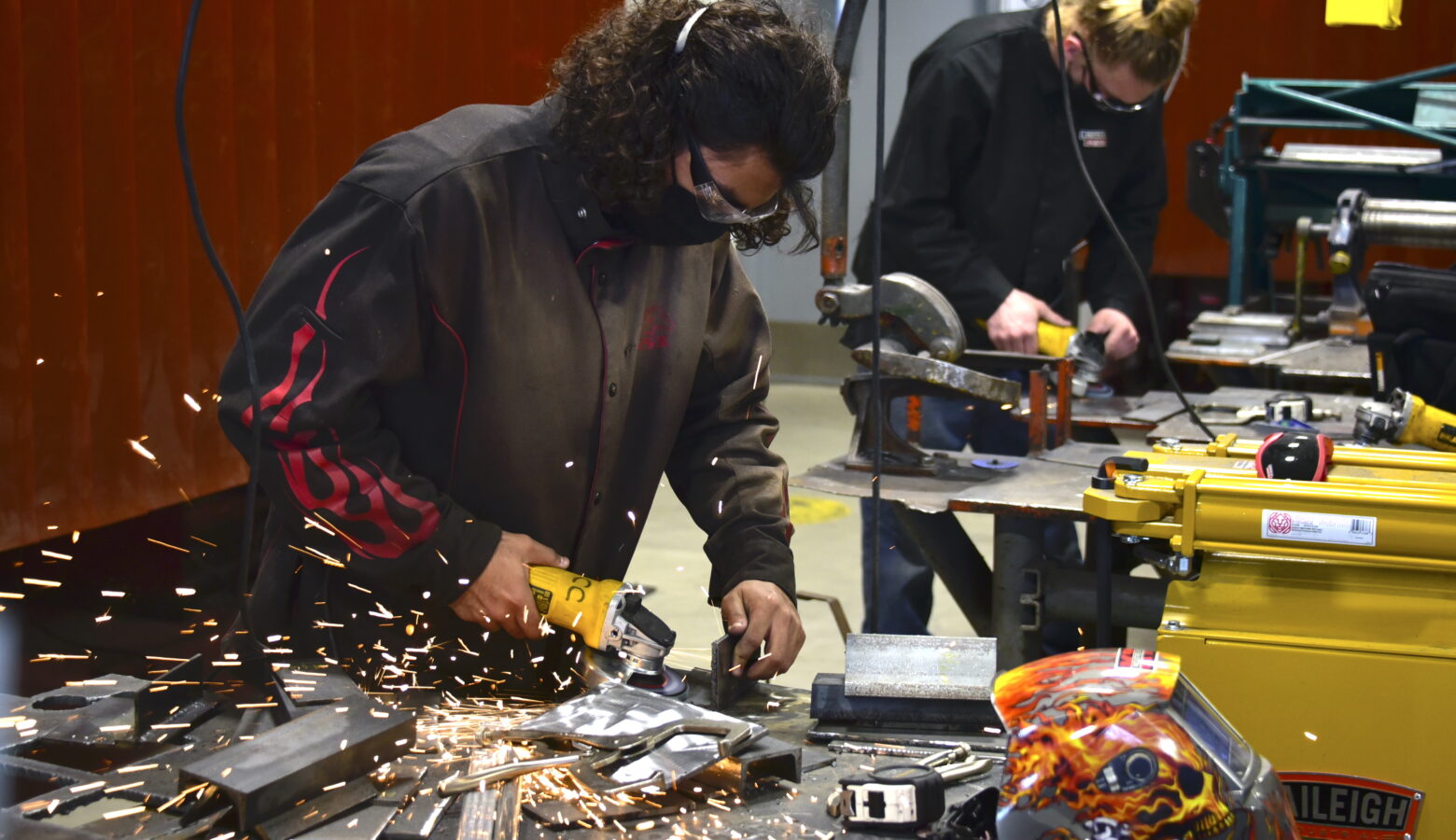‘This proposal fails all our students’: First public comment period ends for new diplomas

Indiana residents are very concerned about the state’s new high school diploma proposal. They spoke out at a public comment session Tuesday to address the most “problematic” aspects of the proposal and ask the state to slow down on the changes.
Parents and educators have voiced opposition to the changes since they were unveiled in March. Many of the comments concerned the rigor and implementation of the new diplomas and a lack of arts, language and history courses.
The first public comment period ended on Tuesday, July 30. The Indiana Department of Education will reveal the state’s second draft of the proposal and kick off the second public comment period later this summer. The department expects to adopt the final proposal later this year.
Jennifer Smith-Margraf, vice president of the Indiana State Teachers Association, said IDOE has an opportunity to address concerns in the second draft.
“We’re very hopeful that the state board has heard the concerns that have been expressed repeatedly since May and that they are going to reflect those concerns in the second draft by giving an update that has genuine changes to it,” she said.
Smith-Margraf encouraged Hoosiers to continue to share their opinions on the proposal at State Board of Education meetings between public comment periods.
Academic rigor, college acceptance
Many residents have encouraged the state to keep the current Academic Honors diploma because it is already accepted by colleges and universities across the country. Educators fear colleges will not admit students who graduate with the new diplomas.
“As the draft language currently stands, the proposed Flex 40 model lacks the necessary rigor while the Flex 40 Plus diploma is unobtainably rigorous for many students and challenging for numerous schools,” Smith-Margraf said.
The president of Purdue University sent a letter to IDOE and the Indiana Commission for Higher Education last week. It said the new diplomas do not meet Purdue’s standards for admission in math, science, language and social studies.
READ MORE: IDOE reveals first draft of high school graduation overhaul, set to take effect 2029
The IDOE is working with stakeholders to develop seals, or pathways, for students interested in enrollment in college or university, enlistment in the military or employment. However, those seals have not been finalized.
“While the state board has stated that seals will be developed to address this issue, we have yet to see what the seal requirements will look like and how those seal requirements will be communicated clearly to students and families,” Smith-Margraf said.
Educators also said they are worried it will be difficult for students to change their minds later in high school if they have traveled too far down a specific pathway.
Loss of fine arts, foreign languages and more
The new GPS and GPS Plus diplomas give students some flexibility to complete required areas. But courses like band, choir, art, foreign languages, orchestra, physical education, history, and geography cannot be used to fulfill any of those requirements under the current proposal.
Educators from a variety of disciplines have asked the IDOE to provide greater flexibility so students can earn credit for courses they are interested in and gain important skills they cannot learn in other courses. Some educators have also expressed fears that if the courses they teach do not meet any graduation requirements, schools may stop offering them.
Wendy Westphal, associate professor of German at Marian University, said the IDOE’s current proposal is a far cry from the Swiss program it is supposed to be modeled after. She said many other countries require students to learn at least one foreign language while in school.
“We are mortified at the elimination and the cuts to all of the academic curriculum proposed in the fine arts, math and sciences, but mostly at the elimination of world languages and world history,” Westphal said. “It’s not an accident that many of our world languages are taught worldwide. In Germany, if you go to university, you’ve had at least three world languages, so the fact that we’re considering cutting them is horrific.”
Band students from the Hamilton Southeastern School Corporation spoke at the last State Board of Education meeting earlier this month to request that band and other music and arts courses be labeled as co-curriculars rather than extracurriculars.
Multiple history and geography teachers have also asked the IDOE to make the requirements more flexible.
Kathy Kozinski, with the Geography Educators’ Network of Indiana, addressed the IDOE on Tuesday to ask geography to be included in the GPS diploma requirements. She said students will miss out on important lessons about transportation and urban development if there are no geography options offered in the proposal.
“The very nature of the title and the rationale of the diplomas implies geographic literacy, right?” she said. “GPS. And geography is left out? Students are navigating their own pathway toward their ideas of success.”
Rushed implementation
Many educators are also concerned about the proposal’s timeline. Current graduation requirements will sunset on Oct. 1, 2028 and the new requirements will become effective for all students in 2029. However, schools can opt in to the new proposal as soon as the 2025-2026 school year.
Amanda Beck is a German teacher at William Henry Harrison High School and mom to a rising eighth grade student. She said the change in graduation requirements is “opaque, confusing and stressful.”
“You’re asking Hoosier parents like me to be OK with our children serving as guinea pigs for a system that doesn’t even exist yet,” she said. “Eighth grade elective night for us this year is in mid-January, and course selection happens in February. I am gravely concerned that these requirements won’t have the vetting, preparation or support necessary to be ready for our kids.”
Join the conversation and sign up for the Indiana Two-Way. Text “Indiana” to 765-275-1120. Your comments and questions in response to our weekly text help us find the answers you need on statewide issues and the election, including our project Civically, Indiana.
Rep. Cherrish Pryor (D-Indianapolis) said her constituents are also concerned about the proposal’s timing. The State Board of Education has to approve the changes before the end of this year, according to state law. But Pryor said the Indiana Department of Education should ask lawmakers for more time.
“We go into session in January. We have Organization Day, so we have an opportunity to make any necessary changes to the timeline that we need to make before they actually get implemented,” Pryor said.
Organization Day is the ceremonial start to the legislative session. New and returning lawmakers are sworn in, and marks the first annual roll call before session starts in earnest in January.
Costs to schools
Some school officials have brought up concerns about the potential cost of the new requirements to schools. Many of the concerns center around student transportation to and from off-campus, work-based learning opportunities. But educators have also brought up concerns that schools will need additional staff like guidance counselors to help students successfully chart their pathways through high school.
Indiana Small and Rural Schools Association Executive Director Christopher Lagoni said his organization investigated how much transportation could cost schools if about 68,000 students across the state entered a work-based learning pathway.
“We’ve calculated the cost as anywhere from $83 million to $300 million, depending on how many students we have to place,” Lagoni said.
He added that bussing students home after school hours would increase that cost and could require schools to purchase additional busses.
“We’re really concerned about unfunded mandates,” Lagoni said. “We really want to make this work. We want students to have opportunities to access everything that they can and meet the expectations the state has.”
Availability, vetting of work-based learning opportunities
Rep. Carey Hamilton (D-Indianapolis) said she was overwhelmed with concerns raised by her constituents about the proposal – especially the work-based learning portion.
“We see major, major problems in the design of this part of the proposal,” she said. “We’ve heard about availability concerns. Are there even job opportunities, high quality learning opportunities, available across our state? I don’t think there are. That’s what we’re hearing.”
Hamilton said there are currently no vetting processes to determine what a high-quality work-based learning opportunity looks like or how schools will ensure students are safe when they are working with outside employers.
“How are we going to keep 16- and 17-year-old kids safe in a work environment that hasn’t supported youth before?” she asked. “Those students, will they feel safe? Will they be safe?”
The IDOE has not issued guidance on how schools should determine which businesses to partner with, whether schools must complete background checks, or who is responsible if a student gets hurt on the job.
Hamilton said Indiana students will not be able to compete nationally or globally if the proposal moves forward in its current form.
“We thought we had this worthy effort to help ensure that all students, not just college-bound students, had a track to where they were supported to succeed in the future,” she said. “I deeply believe that this proposal fails all of our students.”
Kirsten is our education reporter. Contact her at [email protected] or follow her on Twitter at @kirsten_adair.

